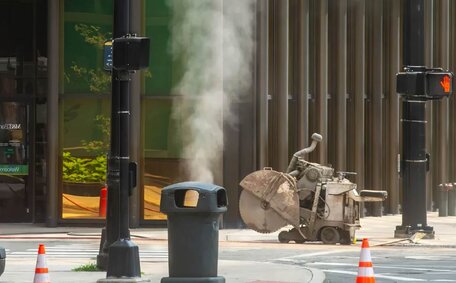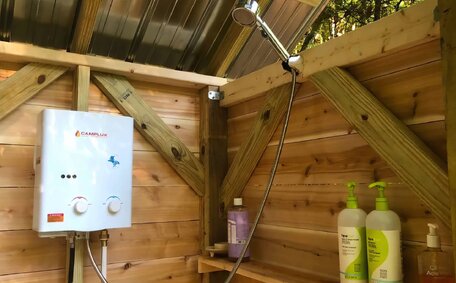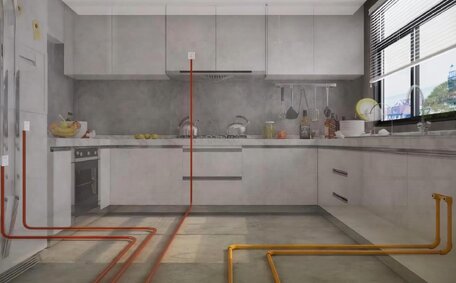
How To Move A Gas Meter
Need your gas meter relocated? You can’t move it yourself - contact your supplier to arrange for a gas engineer to reposition it safely. Charges may apply depending on circumstances.
Read MoreFitting drain covers is a proven method for commercial kitchens to intercept food scraps, grease, and detritus before they sneak into the plumbing network. Mesh strainers and basket screens effectively trap hair, soap, and other debris, acting as a robust barrier for your wastewater system.
Drain screens should be fitted professionally, a service offered by our drain cleaning services to ensure your drains are properly protected and secure. Ensure ample clearance under the strainer for an effective flush into the drain channels, avoiding splashback. Be mindful of what can get through; Regularly lift and clean your screens to keep systems residue-free and ensure thorough rinsing, which prevents debris from entering drains during screen replacement.
When it comes to your kitchen drain, select high-capacity stainless steel sink strainers, meticulously clearing grease and other detritus, thus preserving flow and cleanliness down your kitchen’s conduits. Frequently clean your grease traps and opt out of using aluminium strainers; their lesser durability could let harmful materials into your plumbing. also ensure the screen’s mesh holes are fine enough to detain particles while permitting water to pass freely, which assists in maintaining a consistent standard for restaurant cleaning and drains your sink effectively.
Educating your kitchen staff on dealing with fat oil and grease is crucial for plumbing maintenance and aims to alter habits towards scraping plates into bins, avoiding wash-downs into sink drains.
With diligent drain screen use and disposal practices, eateries can avoid the hazard of clogged drains as lesser amounts of grease fat end up in the plumbing over time.
Enzyme-based drain cleaners can offer an effective, chemical-free strategy to break down accumulated oils fats, and ensure drains can remain clog-free and hospitable to your restaurant’s needs. These natural solutions are packed with bacteria that help by breaking down oils and grease, allowing water to flow consistently without blockage from residues.
When selecting an enzyme cleaner for restaurant drain cleaning, opt for a formula specifically designed to handle the demands of your commercial drains. You might question, 'What frequency should I use for this method?' Ideally, treat bar sinks and floor drains every 1-2 days for best results. Enzymes also complement standard drain maintenance like strainers and screen cleaning.
During off-hours, take action by consulting professional drain cleaning experts or using an enzyme foaming spray to target the grease coating on restaurant drain pipes and maximise dissolution. Allow the foam, or a cup baking soda blend, to engage with your pipes throughout the night before a comprehensive rinse. For heavy buildup, clean your drainage system with additional tactics like mechanical scrubbing with a plumbing snake.
Incorporating enzyme cleaners that specialise in breaking down grease oil into their cleaning routines, restaurants champion exhaustive drain upkeep. Accompanied by thorough drain screen procedures and staff diligence, enzyme treatments ensure facilities conform to health code standards, diminish health risks, and bolster plumbing efficiency.
It’s crucial to ask how temperature affects plumbing; maintaining warm drainage lines stops liquid fats, oils, and grease from solidifying and forming clogs. Industry guidelines recommend maintaining temperatures above 140°F throughout the entire kitchen drain system, effectively preventing the congealing of fats and oils.
Your restaurant can accomplish this through two key methods:
A properly maintained water heater is a cornerstone of your commercial kitchen’s efforts to keep greasy residue in free-flowing liquid states. If grease cools inside pipes, line jetting techniques like hydro jetting may become necessary, as enzyme treatments might not suffice against these solid masses.
Facility managers should conduct routine CCTV drain surveys to monitor temperatures precisely with industrial thermometers. Consistently warm lines will prevent blockages and ensure that a smooth water course runs through your commercial kitchen plumbing systems.
Implementing a consistent cleaning routine for your grease traps is essential as regular checks can prevent these items from creating blockages with preemptive measures. Industry connoisseurs advocate for frequent cleaning sessions of your grease trap, and use drain maintenance practices like hydro jetting to enhance these sessions. This includes exhaustive grease trap cleaning and the removal of stockpiled grease and scrapings, inspecting any operational components, and jetting the lines with forceful water streams as needed to keep drains clear.
alongside quarterly grease trap service, Weekly maintenance checks are crucial for keeping drain pipes grease-free, essential tasks include:
Offering training for your staff is crucial - ensure everyone grasps basic protocols, like scraping plates and emptying fryer oil properly, to prevent practices that may escalate into plumbing problems. Maintain detailed logs of cleaning activities for quick identification of recurring plumbing issues in restaurants.
Strict adherence to regular inspections and cleanings proactively addresses drainage needs, pinpointing minor issues to ensure flawless operation right down to the drains. Marinating vigilance in drain health not only smooths business operations but also skirts potential plumbing issues, addressing them before they escalate to pipe repair stages while adhering to compliance standards.
If your employees responsible for food preparation need help with understanding procedures, thorough training becomes vital for restaurants aiming to avert drain clogs. Employees managing food prep and cleanup are the guardians controlling the amount grease that enters the plumbing system, aiming to minimise what ends up in your drains.
Effective food waste management starts with ensuring peak kitchen tidiness - instruct staff to scrape cooking oil and food from plates and cookware. Dispose of solid food leftovers and scraps in the bin to prevent kitchen sink drain blockages, ensuring a trouble-free experience for your guests. It’s vital to train workers to dry wipe oily utensils before washing to safeguard your customers from the consequences of fats blocking drains, thereby lessening oil transfer.
Demonstrate the appropriate method for discarding fryer oil and other liquids, emphasising how improper disposal can cause blocked drains. Furnish clearly labelled containers to collect waste, averting fats, oils and grease from inching their way into your establishment’s plumbing due to careless disposal.
Kitchen staff should make it routine to inspect and clean drains, using screens to catch fats and oils, as part of their closing duties. Instruct overnight cleaners to dispense enzyme treatments into the floor sink to dissolve any residual grease and keep the drains clean. Comprehending tips for proper drain maintenance, like the necessity of regular snaking, helps prevent unexpected blockages.
Display helpful signs around your sinks to remind employees of best practices and to protect against organic matter clogging your kitchen drains. Cultivating these vigilant drain care habits in your team is key to upholding plumbing health long-term.
With thorough training and accountability, you can protect your commercial plumbing against clogs that might cause temporary shutdowns. This prevents emergency callouts while creating a culture of excellence behind the scenes.
Need your gas meter relocated? You can’t move it yourself - contact your supplier to arrange for a gas engineer to reposition it safely. Charges may apply depending on circumstances.
Read MoreInvesting in a solar hot water system can save up to 75% on water heating costs. With great returns and added home value, solar hot water can be a smart choice over electric or gas heaters. Contact us to see if it’s the right investment for your home.
Read MoreWhile natural gas and propane can both power appliances in your home, they have notable differences when it comes to BTU output, infrastructure, safety, cost and more. Understanding these key contrasts will help you determine which is better for your specific needs.
Read MoreMenai, 2234 NSW
We will call back as soon as possible.




